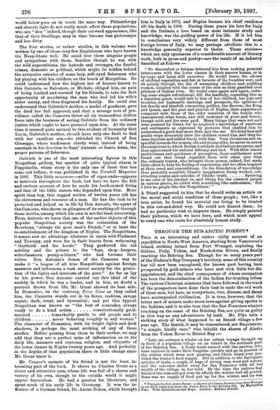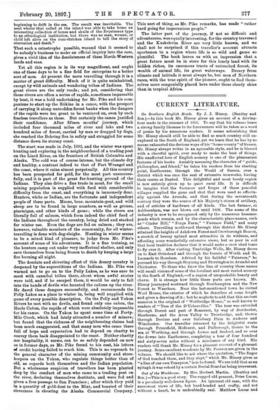THROUGH THE SUB-ARCTIC FOREST.* TEffs is an interesting and rather
chilly account of an expedition in North-West America, starting from Vancouver's Island, striking inland from Fort Wrangel, exploring the Stikine, Pelly, Yukon, and Kuskokvim Rivers, and finally reaching the Behring Sea. Though for so many years part of the Hudson's Bay Company's territory, some of this country has till now been unexplored, the known part having been prospected by gold-miners who have met with little but dis- appointment, and the chief consequence of whose occupation has been the demoralisation of the Indian far-hunting tribes.
The various Christian missions that have followed in the track of the prospectors have done their best to undo the evil work of these men, but here, as everywhere, vice, disease, and decay have accompanied civilisation. It is true, however, that the better sort of miners make stern laws against giving spirits to the Indians, and it is also true that the San Francisco whalers touching on the coast of the Behring Sea, are quite as guilty in this way as any adventurers by land, Mr. Pike tells a striking story of what happened to an Innuit village a few year ago. The Innuit, it may be remembered, are Esquimaux, "a simple, kindly race," who inhabit the shores of Alaska from the Yukon River to Bristol Bay :—
"Late one autumn a whaler on her return voyage brought up in front of a populous village on an island in the northern part of the Behring Sea. A lively trade ensued with the natives, who were anxious to make their bargains quickly and go in pursmt of the walrus which were now passing, and which every year pro- vided the winter's food supply. But in addition to the legitimate articles of trade, a couple of kegs of strong rum were put ashore, and the schooner sailed away for San Francisco with all the wealth of the village in her hold. By the time the natives had finished the rum and got over its effects the walrus had all passed, there was no supply of food put up for the winter, and ice was • Through the Sub-Arctic Forest: a Record of a Canoe Journey from Fort Wrangel to the Nati Lakes and down the Yukon River to the Behring Sea. By Warburton Pike. With illustrations and Maps. London: Edward Arnold. beginning to drift in the sea. The result was inevitable. The next whaler that called at the island was able to take home an interesting collection of bones and skulle of the Esquimaux type to an ethnological institution, but there was no man, woman, or child left alive on the rum-stricken island to tell the story of starvation and death."
That such a catastrophe possible, wasand that it seemed to be nobody's business to make an official inquiry into the case, gives a vivid idea of the desolateness of these North-Western lands and seas.
Yet all this region is in its way magnificent, and ought one of these days to be a fine field for enterprise to a better sort of men. At present the mere travelling through it is a matter of great difficulty. Much of it is quite uninhabited, except by wild animals and wandering tribes of Indians. The great rivers are the only roads ; and yet, considering that these rivers are often a series of rapids, sometimes impassable by boat, it was a bold undertaking for Mr. Pike and his com- panions to start up the Stikine in a canoe, with the prospect of carrying it along untrodden forest banks when the dangers of the rapids were too great to be ventured on, even by such fearless travellers as these. But certainly the canoe justified their confidence. After fifteen months' journey, which included four thousand miles of river and lake and two hundred miles of forest, carried by men or dragged by dogs, she reached the Behring Sea in safety and struggled for some -distance down its stormy coast.
The start was made in July, 1892, and the winter was spent launting and exploring in the neighbourhood of a trading post on the Liard River, on the frontiers of British Columbia and Alaska. The cold was of course intense, but the climate dry -and healthy, a contrast indeed to that of Fort Wrangel and the coast, where it rains almost perpetually. All this country has been prospected for gold, for the most part unsuccess- fully, and it is part of the great far-hunting ground of the Indians. They also drive a fine trade in meat, for the small mining population is supplied with food with considerable difficulty from the coast, and everything is immensely dear. Hunters, white or Indian, are the fortunate and independent people of these parts. Moose, bear, mountain-goat, and wild sheep are to be found in large numbers, as well as grouse, ptarmigan, and other kinds of game ; while the rivers are literally full of salmon, which form indeed the chief food of the Indiana throughout the country, being dried and stacked for winter use. Even the dogs are fed on salmon ; they are, however, valuable members of the community, for all winter-
travelling is done with dog-sleighs. Hunting in winter seems to be a mixed kind of pleasure, to judge from Mr. Pike's account of some of his adventures. It is a fine training, as the hunters camp out under very ineffectual shelter, and only save themselves from being frozen to death by keeping a large fire burning all night.
The desolate and shivering effect of this dreary country is deepened by the superstitions of the Indians. Mr. Pike was warned not to go on to the Pelly Lakes, as he was sure to meet with cannibal tribes there, about whom awful stories were told, and if he escaped them, it would be only to fall into the hands of devils who haunted the canons up the river.
He dared these dangers successfully, and recommends the Pelly Lakes as a place to winter in, being well supplied with game of every possible description. On the Pelly and Yukon Rivers he met with no devils, and found only one canon, the bole Canon, the rapids of which were absolutely impassable or his canoe. On the Yukon he spent some time at Forty- Mile Creek, which had lately attracted a number of miners; but found that the richness of the neighbouring claims had been much exaggerated, and that many men who came there full of hope and expectation had to depend on charity to convey them back disappointed to the coast. Neither charity nor hospitality, it seems, can be so safely depended on now
as in former days, as Mr. Pike found to his cost, his letters 4, I credit having failed to reach him. This is no reproach to
the general character of the mining community and store- keepers on the Yukon, who regulate things better than of old, as regards both themselves and the Indian population.
But a wholesome suspicion of travellers has been planted deep by the conduct of men who came to a trading post on the river, declaring themselves destitute, and were fed and given a free passage to San Francisco ; after which they paid in a quantity of gold-dust to the Mint, and boasted of their cleverness in cheating the Alaska Commercial Company. This sort of thing, as Mr. Pike remarks, has made "rather hard going for impecunious people."
The latter part of the journey, if not so difficult and adventurous, was equally interesting, for the oountry traversed and the Kuskokvim River are very little known, and we shall not be surprised if this traveller's account attracts sportsmen to a region where life is so wild and game so plentiful. The book leaves us with an impression that a great future must be in store for this lonely land with its hidden riches, its enormous tracts of untouched forest, its wealth of animal life, its great waterways. Dreary from climate and latitude it must always be, but men of Northern races, with the true spirit of the pioneer, ought to find them- selves more congenially placed here under these cloudy skies than in tropical Africa.



































 Previous page
Previous page